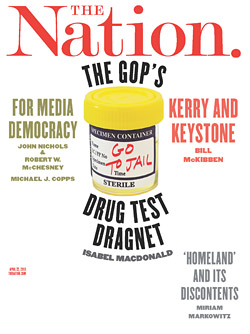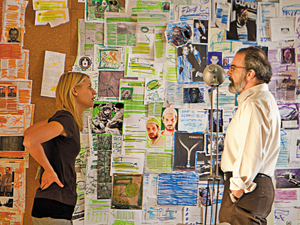Woodward and Manning: Patriots
Suquamish, Wash.
Re “Bob Woodward’s Tantrum, Bradley Manning’s Torment” [March 25]: I find it disturbing that The Nation is trashing Woodward. When someone in the White House sends an e-mail to a journalist, I expect he considers every word carefully. The phrase “You will live to regret…” is, to me, chilling. Rather than supporting a journalistic colleague, you accuse him of being thin-skinned, and you imply, with no evidence, that Woodward was more interested in the Sperling threat than in Manning’s situation.
BERNADETTE FOLEY
Hudson, N.Y.
Your mention of Bob Woodward’s tussle with the White House reminded me of how he became famous—by exposing the corruption of the Nixon White House. This was a courageous act by a whistleblower of the first order. I wonder if Bradley Manning could be seen as a man of similar courage? Remember the Pentagon Papers? When are acts of courage more dangerous for those who blow the whistle than for our national security interests? And who decides?
CATHARINE TYLER
The Wrath of God
Sebastopol, Calif.
At the risk of bringing down on my head the wrath of Barry Schwabsky and the artists he discusses, I submit that the paintings he presents by Griffa and Nozkowski are boring, void of talent and just plain silly [“Endless Representation,” March 25]. I am no doubt out of touch with what one might call modern modernity, or perhaps meta-avant-garde. Frederick Karl, certainly no enemy of the modern, said, “Very possibly the health of a culture depends on its support of the avant-garde, however antagonistic the avant-garde may prove; when that support withers, perhaps we can say the whole culture is dying.” I suggest the reverse: the health of an art form depends on the health of its culture. If our culture is falling into the pits of meaninglessness or nihilism, then art may follow.
But I don’t see that necessarily being the case. For me, an old-fashioned guy, art must inform, inspire and move one. I suppose Griffa’s art kind of does that: I am inspired to feel indifferent and moved to look away. If art can be boiled down to tubes of unused paint and unstretched canvases, then indeed it has fallen into a gulch of absurdity, out of which would no doubt grow the idea that The Pietà is simply overworked stone.
RICHARD SANSOM
Schwabsky Replies
New York City
No need to fret about my wrath when I’m laughing.
BARRY SCHWABSKY
Israel: The Nation and Its People
Providence, R.I.
Vivian Gornick’s “Darkness Lit From Within” [March 25] makes me feel fortunate to be a Nation subscriber. Despite numerous discussions of the political situation in Israel, few, like Gornick, give a perceptive critique of Israeli society.
Thirty years ago, Gornick traveled to Israel to write on the country as she found it, but was “unable to connect” with Israelis, and her accumulated notes “were all in the negative.” She could not, in good conscience, write a book “without sympathy.”
As an Israeli living in America, I can help Gornick with what is admirable in Israel: it is an upstart state, built on the shoulders of pioneers who drained the malaria swamps, worked the land, fought Arab assaults, and built roads, ports, factories, kibbutzim and cities. Tel Aviv is now a beautiful city with parks, beaches, arts centers, museums, shaded avenues and vivid gardens. A city that thus invests in its citizens could not be entirely “negative.”
I agree with Gornick, however, that it is the people who make Israel such a difficult place to live. During her recent visit, she heard A.B. Yehoshua speak. Although a leftist, he pontificated on who is and is not a Jew, writes Gornick, “like a West Bank settler with a gun in his hand and murder in his heart, declaring the land of another his land.” She adds, “It’s the bully behind the sound…that makes one cringe.”
This is a profound observation, and I fully agree: relationships in Israel are rarely based on tolerance, compassion or love. Israelis often think of themselves as fighters: they fight not only the Palestinians but often each other—in the streets, in the banks, in hospitals, in schools, in lines, in stores. Israeli society is an angry society, where rage and insults may erupt around seemingly peaceful corners, or among family members. Why are Israelis so closed up, unfriendly and suspicious of one another? One of Gornick’s answers is particularly insightful: the “tribalism” of Israeli culture.
At a young age, I migrated from my native Hebrew to the English language and eventually became an English professor. I loved the Hebrew language, but I discovered that while Hebrew literature is preoccupied with Zionism and its politics, Anglo-American literature taught me about personal feelings, moral courage and my own inner world.
One hears endless discussions on how to bring about peace in Israel. Yet the human factor is rarely present. The intolerance and hatred of the Other should be discussed openly. If both peoples could apologize and create a Truth and Reconciliation Commission, perhaps the Middle East could be redeemed. But I don’t see this happening soon.
SHELLY SPILKA
Variations on a Theme
Roseville, Minn.
I prefer Glenn Gould’s first version of the Goldberg Variations [“Letters,” Feb. 18]. I listen to music on a forty-year-old Magnavox and play CDs on monaural mode because, as band leader Stan Kenton told us between sets at a concert in St. Paul, “that’s the way you hear the music live.” I love Gould, but I also like hearing other Goldbergs, especially on the harpsichord, e.g., with Wanda Landowska.
WILLARD B. SHAPIRA
Jackson, Mich.
Forget Glenn Gould. If you want to hear the secret voices in the Goldberg Variations, and I do not mean Gould’s humming, listen to Minsoo Sohn.
MARK MUHICH
Please support our journalism. Get a digital subscription for just $9.50!
About Those ‘Timeless Whoppers’ Ads
Franklin, N.H.
I just have to tell you how much color and entertainment you have provided for my drab little subsidized senior apartment (which is owned by a different set of crooks, but that’s another story). I have formed a line of your “nose ads” at eye level across my living/dining area, taped at the top only and directly over baseboard radiators so that they not only provide color, but also motion as they wave in the breeze of the rising heat!
I think I have every one of the nose ads, plus the 1 Percent Court ad and the Greedy Lying Bastards ad. That particular one is posted near the door so no one can leave without seeing it. My few guests spend time looking them over. Thank you for the marvelous additions to my drab off-white walls.
SELDEN R. STRONG Read More
Our Readers









